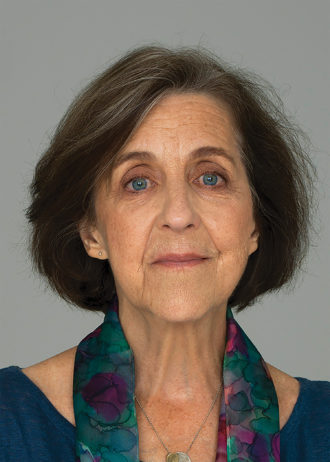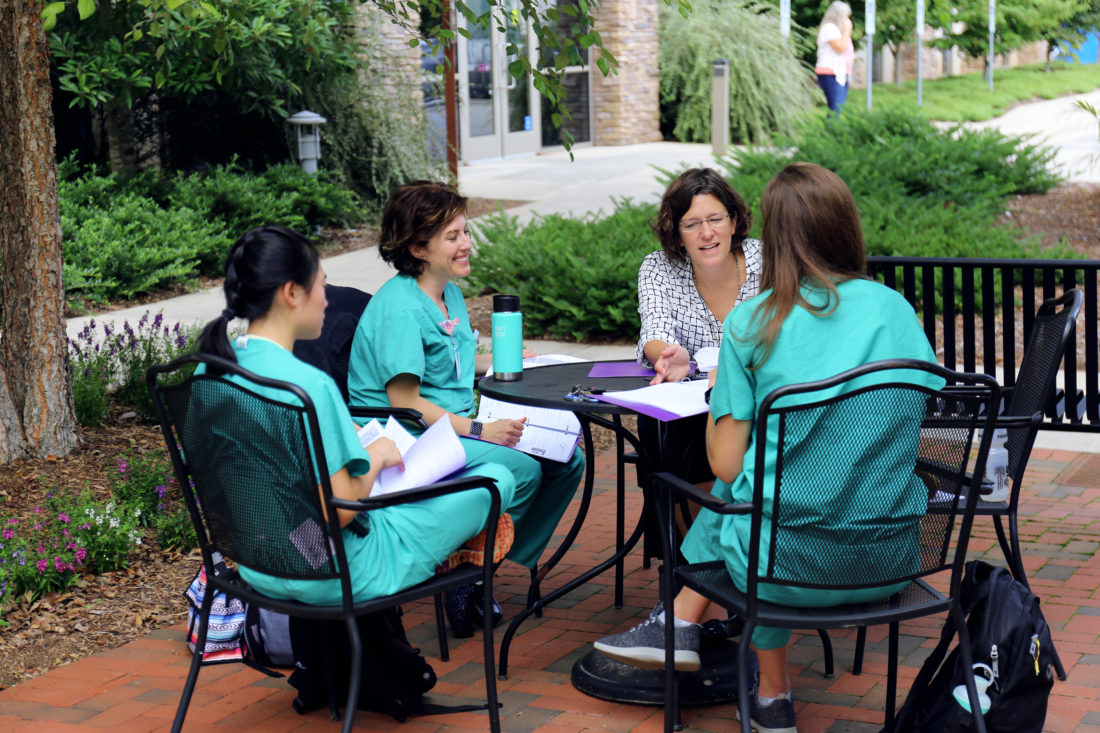When Laura Hope-Gill first proposed a narrative health care program for Lenoir-Rhyne University back in 2015, the assistant professor of writing received anything but a warm welcome. “When I brought this topic up to people, I was met with incredible resistance and arguments that would actually get emotional about how this could never work,” she recalls. “It seemed that people were very invested in protecting the line between the humanities and the sciences.”
Fast forward to 2019, and Hope-Gill tells a different story. Her certificate course at the Asheville campus, which explores how an understanding of narrative can lead to better outcomes for patients and practitioners alike, has graduated approximately 20 students in fields ranging from surgery to social work. Hope-Gill herself now receives regular invitations to speak on the topic and advise hospital systems on ways to incorporate the humanities into their work.
The field is set to gain even more local visibility thanks to an upcoming event that Hope-Gill has organized. Medicine Beyond Medication, North Carolina’s first statewide symposium on narrative health care, will take place at the Mountain Area Health Education Center’s Hendersonville Road campus on Friday and Saturday, Oct. 18-19. It will focus on the use of creative and reflective writing to supplement clinical practice. To register, visit narrativehealthcare.net.
Keynote speaker Dr. Rita Charon, who founded the narrative medicine program at Columbia University, presented the 2018 Jefferson Lecture in the Humanities. The lectureship is the federal government’s highest honor for intellectual achievement in those fields. Other presenters will include Dr. Jeff Heck, MAHEC’s CEO, and several graduates of Lenoir-Rhyne’s program, including Dr. Daniel Waters, a surgeon; Dr. Cynthia Yancey, a general practitioner; and Laurie Kovens, a social worker.
“The interest in narrative health care is part of a rising wave,” notes Hope-Gill. “People are realizing that the commodity-based concepts of health as we have known them are insufficient for describing the real work that practitioners do and experience. We are right in time with a cultural shift.”
Hearing exam

At the core of narrative health care, Hope-Gill explains, is the concept of close listening. Much of modern medical training, she says, is focused on quantitative data — particularly the numbers and measurements that can be captured in a patient’s electronic health record. This, however, can cause health care workers to miss valuable information that doesn’t fit in those boxes.
“We’re changing how the clinical encounter is carried out. It’s no longer ‘Here, we have eight minutes: Tell me where it hurts,’” says Hope-Gill. “It’s the physician saying, ‘What do I need to know in order to provide you with good care?’”
Hope-Gill tells the story of a patient who refused to use an oxygen tank, which led to multiple costly emergency room visits. The patient’s care providers discussed the problem at length among themselves, but they didn’t make progress till they asked her directly why she wouldn’t comply. It turned out that when the patient was a child, her mother had been on oxygen and had an accident with the tank, causing a fire that destroyed their home.
“By involving the patient in her own care, somebody could go to her trailer and retrain her in how to use [the oxygen tank], so she could do it with confidence,” Hope-Gill continues. “And she stopped needing visits to the emergency room.”
Heck agrees that listening to stories can be a powerful tool in the healing process. He often encourages his patients, many of whom are elderly, to bring in a photo from when they were younger and describe the circumstances in which it was taken.
“I’ve had patients tell me about a failed marriage or a traumatic event in their childhood that permanently affected the way they think and that flavors every diagnosis, the success of every treatment,” Heck reveals. “When I really understand where the patient came from, I have a much better understanding of how they will respond to medications, how they like to be addressed and talked to. It’s really valuable.”
New old thing

Although the principles of narrative health care are gaining traction, says Charon, other aspects of the current medical environment can discourage care providers from truly listening to patients. She cites the common hospital practice of assigning patient quotas and penalizing doctors who don’t meet those targets, which pushes them toward ever-shorter appointments.
Reimbursement structures set by insurers and government organizations, continues Charon, often value technical expertise more than efforts to build relationships. Consultations with some subspecialists can be billed at many times the cost of generalist visits, she says, even though the latter typically give patients more opportunity to share their stories and bring up health concerns before they become bigger problems.
“The decisions that filter down into what a patient actually experiences when she comes in to check her health are governed by all of these layers of political, economic — and greedy, in some cases — decisions,” says Charon. “I’m not saying that all of the structure is malicious, but we’re muddling through a system that’s not really designed in the best interest of the patient.”
Unsatisfying encounters with this system, she points out, can lead patients to seek out one or more of the many alternative or integrative healers who flourish in the Asheville area. Those practitioners, she notes, often do a better job of treating patients as people. Charon views narrative health care as a way for mainstream medicine to incorporate “the wisdom, the attention, the delicacy, the individual commitment to patients that we can see in these other forms of health practice.”
Shifting the story
In his role as the head of MAHEC, Heck says he strives to impress the importance of narrative on the health care providers who train with his organization. “I think good physicians are very interested in understanding patients,” he says. “I think our instructors generally believe that the best medical student is the curious one, not the smart one.”
Heck mentions MAHEC’s new Simulation Center as one way to foster that curiosity. There, trainees can interact with “standardized patients”: actors trained to portray different medical cases, in rooms that look just like real clinical spaces but are equipped with cameras and two-way mirrors for observation. After such exercises, the standardized patients can offer detailed feedback about how they were treated.
“They might say something like, ‘Hey, you asked me almost immediately about shortness of breath and chest pain, but you forgot to ask me about how I’m feeling,’” Heck explains. “It’s so important in every visit to understand, from the beginning, ‘What are you concerned about?’”
That kind of training, supplemented by programs like the upcoming symposium and the Lenoir-Rhyne course, can change health care for the better, Hope-Gill believes — and not just for patients. Narrative principles can help practitioners make sense of the often stressful work they do and, thus, reduce the risk of burnout, a growing problem among medical professionals.
“Story is how we navigate illness, just as it is how we navigate life,” Hope-Gill declares. “Narrative health care establishes physician and patient, and all other clinicians and patients, as characters in a story, each with a voice and a vision for how they want a diagnosis to play out.”
Her remarks echo a passage in The Principles and Practice of Narrative Medicine, a major textbook in the field that Charon co-authored. She wrote: “We have gradually come to recognize that the having of a human body gives us a rare ground of unity — we share the same body, we have the same organs, we are prey to the same diseases, and we all will die.”



Before you comment
The comments section is here to provide a platform for civil dialogue on the issues we face together as a local community. Xpress is committed to offering this platform for all voices, but when the tone of the discussion gets nasty or strays off topic, we believe many people choose not to participate. Xpress editors are determined to moderate comments to ensure a constructive interchange is maintained. All comments judged not to be in keeping with the spirit of civil discourse will be removed and repeat violators will be banned. See here for our terms of service. Thank you for being part of this effort to promote respectful discussion.